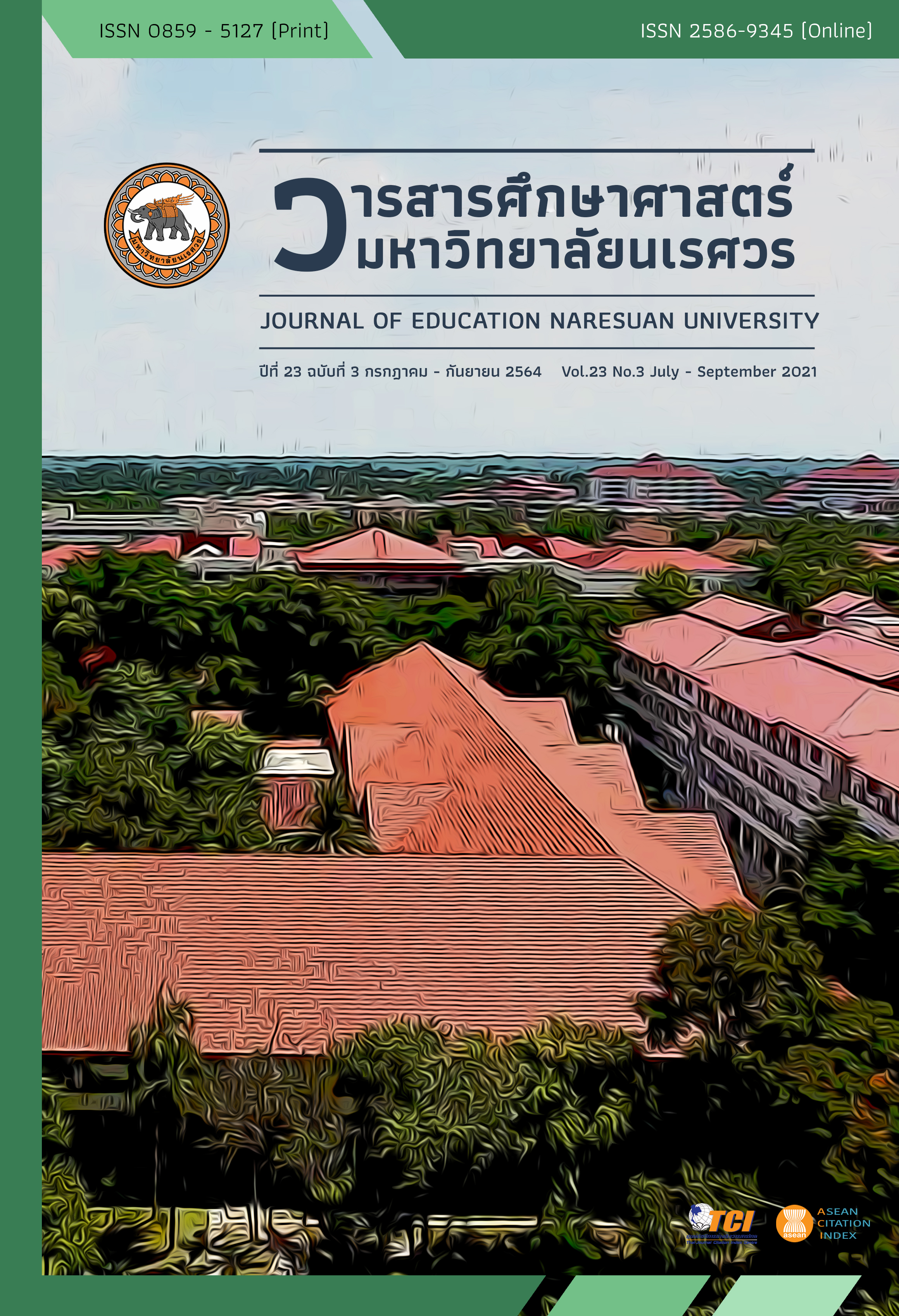A JOURNEY TO ENHANCE YOUTH IN ENTREPRENEURSHIP: INVESTIGATION OF ENTREPRENEURIAL COMPETENCIES AND DEVELOPMENT NEEDS
Main Article Content
Abstract
According to United Nations Sustainable Development Goals, entrepreneurship, especially among youths, has been the key driving force for the world economy and social change. This is important as 52% of the world’s youth is present in the Asia Pacific region. While Thailand has the second-highest level of entrepreneurial intention at 31.9%, the country suffers from a lack of good quality entrepreneurial education. The previous literature has not revealed enough on entrepreneurial competencies among youths, as well as opportunities for development needs. Therefore, uncovering youth entrepreneurial competencies and development opportunities can help unleash the potential of youth entrepreneurship. This study aims to 1) confirm the factors and indicators of entrepreneurial youth competencies, 2) identify the development needs among youths at the university level to provide recommendations on how to design effective learning for entrepreneurial education, and 3) the results will support the creation of the youth entrepreneurship learning program. The population of the study is made up of undergraduate students from universities in Thailand, and 689 effective responses were received in the survey. In accordance with confirmatory factor analysis (CFA), the 6 aspects of entrepreneurial youth competencies, consisting of opportunity, relationship, conceptual, management, strategic, and commitment competency, are confirmed since the empirical data is consistent with the theoretical measurement. However, there are 3 competencies; opportunity, relationship, and commitment that were found to have a significant causal relationship with entrepreneurial intentions from logistics regression analysis. The key priority needs for driving effective entrepreneurial education are personal learning assistance, design thinking integrated with content knowledge, and pedagogy through mobile learning applications. The prototype of the mobile learning application with design thinking and personal learning assistant is developed and proposed to promote entrepreneurial competencies among youths.
Article Details
The owner of the article does not copy or violate any of its copyright. If any copyright infringement occurs or prosecution, in any case, the Editorial Board is not involved in all the rights to the owner of the article to be performed.
References
Alvani, S.M. (2011). Entrepreneurship, synergy individuals, society and culture. Business and Society, 134, 5-9.
Ataei, P., Karimi, H., Ghadermarzi, H., & Norouzi, A. (2020). A conceptual model of entrepreneurial competencies and their impacts on rural youth's intention to launch SMEs. Journal of Rural Studies, 75, 185-195.
Bauman, A., & Lucy, C. (2019). Enhancing entrepreneurial education: Developing competencies for success. The International Journal of Management Education, 19(1). DOI:10.1016/j.ijme.2019.03.005
Bigos, K., & Michalik, A. (2020). Do emotional competencies influence students’ entrepreneurial intentions? Sustainability, 12(23), 1-18.
Chauke, T. A., & Obadire, O. S. (2020). Using gender differential motivations in youth entrepreneurship as economic survival strategy in South Africa. Gender & Behaviour, 18(1), 15202-15216.
Fortunato, M. W. P. (2014). Supporting rural entrepreneurship: a review of conceptual developments from research to practice. Community Development, 45(4), 387-408. DOI: 10.1080/15575330.2014.935795
Gabriel, L., & Markus, K. (2019). University entrepreneurial education: a design thinking approach to learning. Journal of Innovation and Entrepreneurship, 8(1), 1-11.
Global Entrepreneurship Research Association. (2020). Global Entrepreneurship Monitor Global Report 2019/2020. Retrieved from https://www.gemconsortium.org/
Global Entrepreneurship Research Association and Bangkok University. (2020). Global Entrepreneurship Monitor Thailand Report 2019/2020. Retrieved from https://www.gemconsortium.org
Grivokostopoulou, F., Kovas, K., & Perikos, I. (2019). Examining the impact of a gamified entrepreneurial education framework in higher education. Sustainability, 11(20), 5623. DOI:10.3390/su11205623
Hair J, J., Black, W., Babin, B., Anderson, R., & Tatham, R. (2006). Multivariate data analysis. United States of America: Pearson Prentice Hall Upper Saddle River.
Hall, J. K., Daneke, G. A., & Lenox, M. J. (2010). Sustainable development and entrepreneurship: Past contributions and future directions. Journal of Business Venturing, 25(5), 439–448.
Ibidunni, A. S., Mozie, D., & Ayeni, A. W. A. A. (2020). Entrepreneurial characteristics amongst university students: insights for understanding entrepreneurial intentions amongst youths in a developing economy. Education and Training, 63(1), 71-84.
Koh, J. H. L., Chai, C. S., Wong, B., & Hong, H. Y. (2015). Design thinking for education: Conceptions and applications in teaching and learning. singapore: Springer.
Kruger, S., & Steyn, A. A. (2020). A conceptual model of entrepreneurial competencies needed to utilise technologies of Industry 4.0. International Journal of Entrepreneurship and Innovation. https://doi.org/10.1177/1465750320927359
Lang, R., & Fink, M. (2018). Rural social entrepreneurship: The role of social capital within and across institutional levels. Journal of Rural Studies, 70. 10.1016/j.jrurstud.2018.03.012.
Man, T. W. Y., Lau, T., & Chan, K. F. (2002). The competitiveness of small and medium enterprises: A conceptualization with focus on entrepreneurial competencies. Journal of Business Venturing, 17(2), 123-142.
Mkrtchyan, T., & Galoyan, D. (2020). Problems in the development of youth entrepreneurship in the Republic of Armenia. Journal of Business Management, (18), 53-75.
Ngorora-Madzimure, G. (2016). Rural entrepreneurship and welfare in South Africa: A case of Nkonkobe Municipal Area in the Eastern Cape Province. Journal of Economics, 7(2–3), 169–178.
Ojiaku, O. C., Nkamnebe, A. D., & Nwaizugbo, I. C. (2018). Determinants of entrepreneurial intentions among young graduates: perspectives of push-pull-mooring model. Journal of Global Entrepreneurship Research, 8(24), 1-17.
Wongwanich, S. (2015). Need assessment research (3rd ed.). Bangkok: Chulalongkorn University Press.
United Nations. (2019). Sustainable development goals. Retrieved from https://sustainabledevelopment.un.org/partnership/?p=23553
Wathanakom, N., Khlaisang, J., & Songkram, N. (2020). The study of the causal relationship between innovativeness and entrepreneurial intention among undergraduate students. Journal of Innovation and Entrepreneurship, 9(1), 1-13.
Xiang, L. (2009). Entrepreneurial competencies as an entrepreneurial distinctive: An examination of the competency approach in defining entrepreneurs (Master thesis). Singapore: Singapore Management University.
Zhao, H., O'Connor, G., Wu, J., & Lumpkin, G. T. (2021). Age and entrepreneurial career success: A review and a meta-analysis. Journal of Business Venturing, 36(1). DOI: 10.1016/j.jbusvent.2020.106007
Zhartay, Z., Khussainova, Z., & Yessengeldin, B. (2020). Development of the youth entrepreneurship: Example of kazakhstan. Entrepreneurship and Sustainability Issues, 8(1), 1190-1208. DOI: 10.9770/jesi.2020.8.1(80)


